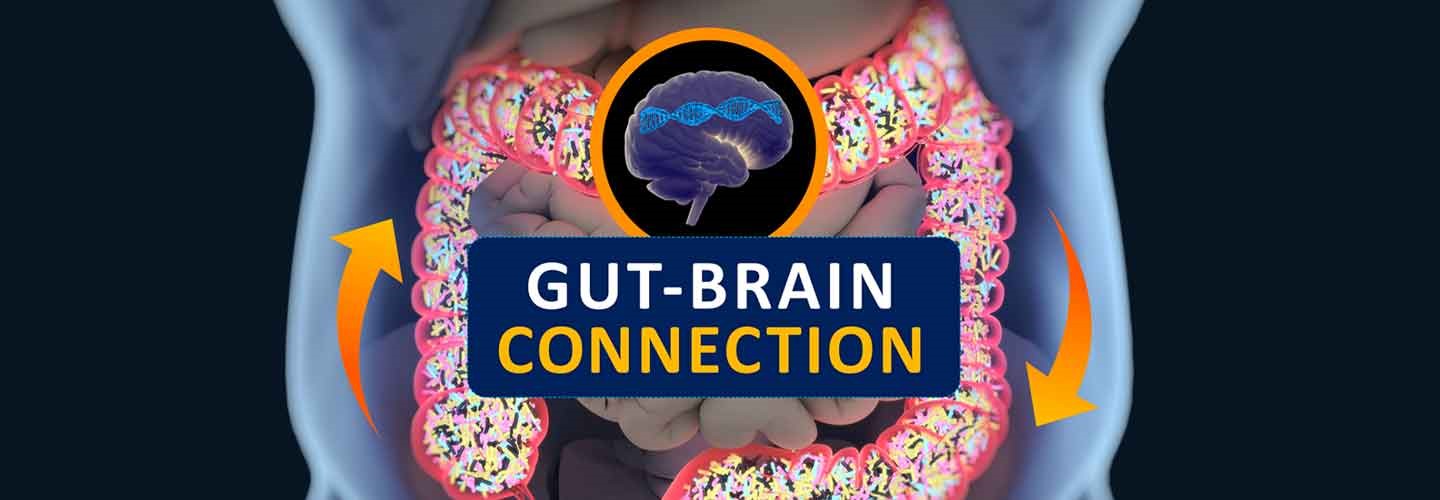Your Mighty Moody Microbiome – Part 2 How “Messages from Bugs” Affect Our Mental Health
- Home
- Blog

Reader, have you ever found yourself so absorbed in your thoughts that you forget about the world around you—so preoccupied that you are completely unaware of your emotions and your bodily sensations? I admit, I’ve experienced many of these moments over the years. Thanks to the ubiquity of smartphones, tuning out is made all the more easy. While our minds can’t function without our holobiont—orchestrated by the DNA in our 32 trillion cells and 90 trillion microorganisms—our bodily functions can become an afterthought—something we must lug around to get our brains to go where they need to go, or to show our minds what they want to see (like the latest Facebook post or Instagram message). One great human fallacy of our modern era is to think our brains are responsible for themselves. Reader, if you’ve been following along with this blog, you’ll know that’s simply not the case. Our brains coexist with and are enormously influenced by a complex “second brain” inside of us. Resting entirely outside of the brain is a powerful behemoth—an independent yet symbiotic living organism all its own that may decide our desires before we can name them; may create hunger or other cravings; may make us moody and sleepless. It is a symbiosis that promotes health or disease. If we’re not careful, it is this organism—not our conscious minds—that has the power to determine our fate. That behemoth has a name: the microbiome, or the trillions of bacteria living in your gut. Those ”bugs” are no dummies. They can modify your genetic expression, they can speak to your nervous system, and they can wreak havoc on their home in your own intestinal tract. This week, we’re going to take a broad look at how your microbiome impacts your mental health, and why you would do well to take care of it and keep it happy!
Can ”Messages from Bugs” Influence Your DNA and Your Destiny?
As we’ve read in prior blogs, our DNA is not a fixed factor in determining our mental and physical health. We may be born with particular gene variants, but the way those genes are expressed depends on a series of dynamic environmental factors, many of which can be tweaked, altered, and adjusted. The ability to turn gene variants on or off—or to upregulate or downregulate a gene—is known as epigenetics, which you can read about in our prior blog on the topic here. Epigenetic influencers include factors as large and unwieldy as the cities we live in to more specific factors, like the foods we consume, or the people we love or work with. However, influencers aren’t always external—in fact, one of our greatest epigenetic modulators exists inside our own bodies, lining our gut, our skin, our mouth, and more. Your gut microbiota is directly influenced by the foods you eat—and subsequently by the nutrients it can extract to feed itself. In turn, various bacteria found in your microbiome can exert epigenetic effects on your DNA, through a complex set of “messages from bugs.” As just one example, elements in the microbiota have been shown to both promote and limit obesity expression—which in turn can have a significant impact on our mental health outcomes.
As an epigenetic modulator, your microbiome also plays a significant role in your immune programming system. Have you ever met someone who simply never gets sick? They likely have a healthy microbiome to thank. If you were born with and cultivate a healthy and diversified microbiome, those trillions of bacterial cells will come to your aid in staving off chronic inflammation and promoting immune cell homeostasis. A dysregulated microbiome, on the other hand, may leave your body chronically inflamed and prone to acute illness and a higher likelihood of diseases. This imbalanced state is known as dysbiosis. Inflammaging can play a role in a number of mental health conditions, including chronic fatigue and dementia. Bottom line: keeping your microbiome in a balanced state is an important component in your DNA expression and mental health outcomes.
How Do These Bugs Impact Your Mental Health?
So, the gut microbiome plays a critical role in our gene expression—and it can help to bolster our immunity. But is there a more direct connection between our gut and our mental health? You bet there is—and it’s become so well documented in recent years it’s even been given a name: the Gut-Brain Axis. Our gut bacteria aren’t just microscopic mooches, eating whatever nutrients they can get. No: this second brain also sends messages to our first brain —and those messages play a direct role in our mental health. As numerous studies have found, “healthy gut function has been linked to normal central nervous system function”, and a dysregulated microbiome has been shown to have an impact on nervous system disorders, including depression, bipolar disorder, anxiety, schizophrenia, autism, and others. Certain genetic variations tested by the Mindful DNA Assay may also predispose to dysbiosis, including FUT2, HLADQ2/8, stress response genes and BDNF.
We will be looking closely at the connection between our bacteria and our brains in future blogs in this series—including genetic testing of the bugs themselves—nd if you or a loved one is impacted by one or more of these disorders, it’s worth your time to stick around for them.
The Gut-Brain Axis is not the only way our microbiome impacts our mental health, however. A healthy microbe can bolster our defenses against “leaky gut syndrome”, also known as “intestinal permeability”. A healthy microbiome means a healthy gut lining, which in turn keeps partially digested food and nutrients well within the confines of our intestinal tract and helps our bodies absorb those nutrients into our bloodstream. An unhealthy microbiome leads to an equally unhealthy gut lining, which can develop cracks that allow food to seep out and toxins and other bugs to creep into our bloodstream triggering an immune response to these “foreign bodies.” Leaky gut can not only lead to poor physical health, but negative mental health outcomes as well—obesity, chronic fatigue syndrome, and mental illness have all been associated with a leaky gut.
Keeping the many bacterial cells in your microbiome healthy and happy is not only good for your body—it’s crucial to your mental health. Next week, we’ll take an even closer look at how the microbiome impacts our neurotransmitters. Stay tuned!
Related Information
- Learn about Genetic Testing
- Learn about Potomac Psychiatry
- Meet Our Doctors
- Contact Potomac Psychiatry
.png?width=144&height=144&name=Untitled%20design%20(34).png)


